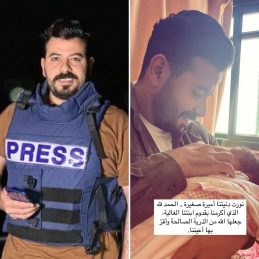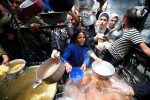GAZA, (PIC)
Inside the neonatal unit at Nasser Hospital in Khan Yunis, southern Gaza, tiny bodies lie motionless in incubators, barely moving and covered with light medical cloths, while life-support machines struggle to keep them alive amid an Israeli war now stretching into its 19th month.
There are no cries or wails typically heard in newborn wards—only a heavy silence and faint groans, reflecting extreme frailty and critical health conditions. The scene leaves families in a constant state of anxiety, as they face a completely collapsed healthcare and nutrition system due to the ongoing Israeli blockade of the Strip.
For seven weeks now, not a single shipment of food or medical supplies for newborns has been allowed in—the longest such interruption since the outbreak of Israel’s genocidal war on Gaza on October 7, 2023, according to medical sources.
This blockade has led to a severe deterioration in medical services and poses a direct threat to the lives of dozens of babies in incubators and maternity wards, says pediatrician Dr. Fidaa Al-Nadi.
Dr. Al-Nadi explains that the hospital is facing an acute crisis in providing suitable milk for infants, particularly those with digestive issues. There’s also a severe shortage of diapers and other basic supplies.
“These essentials are completely unavailable and cannot be easily substituted,” she says. Malnutrition among mothers during pregnancy is also directly affecting the health of newborns.”
She stressed that the ongoing Israeli blockade is directly endangering the lives of children. “Those who survived the bombings are now trapped by starvation policies imposed by Israel as part of its war of extermination—backed by the US.”
Dr. Al-Nadi issued an urgent appeal to the international community and relevant organizations to open Gaza’s border crossings immediately, emphasizing that doing so is the only way to save children’s lives. “Every day of delay increases the danger to these children—we have no alternative and no extra time,” she added.
Since March 2, Israeli occupation forces have completely closed all crossings into Gaza, blocking the entry of food, medicine, and other goods.
Supplementary food blocked
According to UNICEF, children’s and neonatal hospitals in Gaza “lack adequate medical equipment and are operating under extremely difficult conditions” as Israeli attacks persist for over a year and a half.
In a post on its account on X (formerly Twitter), UNICEF stated, “The survival of Gaza’s children depends on reinstating a ceasefire and allowing aid into the Strip.” The organization stressed the urgent need for renewed humanitarian access.
UNICEF explains that hospitals treating infants and children are under-equipped and overwhelmed. Edward Beigbeder, UNICEF’s Regional Director for the Middle East and North Africa, noted that the organization has thousands of trucks loaded with life-saving aid ready to enter Gaza.
“But instead of saving lives, they’re being stockpiled,” he said. “They must be allowed in immediately. This is not a choice or a favor—it’s an obligation under international law.”
UNICEF warns that children being treated for malnutrition are in grave danger. Since March 18, 2025, 21 treatment centers—about 15% of all outpatient clinics—have been closed due to displacement orders or bombings. Now, 350 children who depend on these centers face worsening malnutrition that could be life-threatening.
The agency adds that vital supplementary foods for infants—crucial for development, especially amid food shortages—have run out in central and southern Gaza. Only enough ready-to-use infant formula remains to feed 400 children for one month.
UNICEF estimates nearly 10,000 babies under six months old need supplemental nutrition. Without proper formula, families may be forced to resort to unsafe substitutes made with contaminated water.
Children are going to sleep hungry
UNRWA, the United Nations Relief and Works Agency for Palestine Refugees, says the Israeli siege—tightened over the past seven weeks—is the harshest since the early months of the war following October 7, 2023.
In a statement released last Friday, UNRWA reported that 420,000 people have been newly displaced in Gaza since the resumption of large-scale military operations last month.
Juliette Touma, UNRWA’s Director of Communications, said, “Children and infants in Gaza are going to sleep hungry,” as essential supplies in the Strip near total depletion.
She noted that this new wave of famine comes while Palestinians are still reeling from previous cycles of deprivation. For the past 18 months, Israel has severely restricted the entry of humanitarian aid, depriving hundreds of thousands of families of food assistance.
This worsening humanitarian crisis is unfolding amid the total collapse of Gaza’s health system, caused by the ongoing Israeli offensive and the blockade on medicine and medical supplies.
In a statement on Tuesday, the UN Office for the Coordination of Humanitarian Affairs (OCHA) declared that the humanitarian situation in Gaza is now the worst since the start of the war. It noted that the intensified blockade since March 2 has completely halted the flow of aid, exacerbating the crisis further.
Gaza has now been under blockade for 18 years. Around 1.5 million of its 2.4 million residents have been left homeless due to the destruction of their homes during the war. The Strip has effectively entered a state of famine due to the total closure of its crossings.
Backed by the US, the Israeli occupation army continues to commit acts of genocide that have killed or injured more than 167,000 Palestinians—most of them women and children—with over 11,000 still missing.















